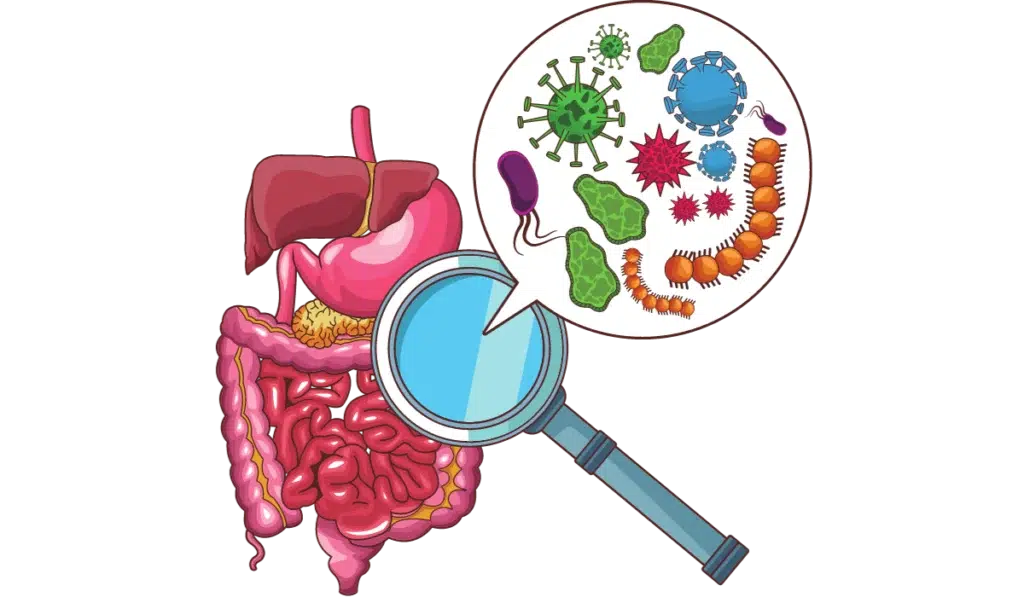Power of Prebiotics, Probiotics, and Synbiotics Against Constipation
Dive into the benefits of prebiotics, probiotics, and synbiotics in combating constipation and promoting optimal digestion.

Research on the effects of prebiotics, probiotics, and synbiotics on constipation has shown varied results due to differences in study protocols A Trusted Source Chmielewska A, Szajewska H. Systematic review of randomised controlled trials: probiotics for functional constipation. World J Gastroenterol. (2010) 16:69–75. doi: 10.3748/wjg.v16.i1.69[PubMed Abstract, CrossRef Full Text, Google Scholar] A Trusted Source Dimidi E, Christodoulides S, Fragkos KC, Scott SM, Whelan K. The effect of probiotics on functional constipation in adults: a systematic review and meta-analysis of randomized controlled trials. Am J Clin Nutr. (2014) 100:1075–84. doi: 10.3945/ajcn.114.089151[PubMed Abstract, CrossRef Full Text, Google Scholar].
In This Article:
Key Points
- Gut's Role in Overall Health: The gut is not only essential for digestion but also plays a pivotal role in various aspects of our health, including the immune system and mood regulation.
- Significance of Microbial Elements: Prebiotics, probiotics, and synbiotics are emerging as vital components in understanding and improving gut health, particularly in addressing constipation issues.
- Chronic Constipation: One of the most common health challenges, constipation's complications and discomforts can be potentially alleviated through a better understanding and application of prebiotics, probiotics, and synbiotics.
- Exploration of Biology, Nutrition, and Health: The content offers a deep dive into the intersection of these fields, emphasizing the role of microbial compounds in ensuring a balanced digestive system.
- The Potential of Prebiotics, Probiotics, and Synbiotics: These compounds are highlighted as promising solutions to unlock optimal gut health and combat constipation, paving the way for future research and applications in health and nutrition.
Introduction
Our gut, often referred to as our second brain, is a marvel of biological engineering.
Beyond its primary role in digestion, it holds the keys to our overall health, affecting everything from our immune system to our mood.
With modern science diving deeper into the intricate world of gut microbiota, the spotlight has increasingly shifted toward three key players: prebiotics, probiotics, and synbiotics.
These elements have shown tremendous promise in addressing one of the most common, yet overlooked, health challenges we face today: constipation.
This article endeavors to unravel the potent capabilities of these microbial wonders, highlighting their significance in promoting optimal gut health and battling the discomforts and complications of chronic constipation.
Join us as we delve into the fascinating intersection of biology, nutrition, and health, exploring the power these compounds wield in unlocking a healthier, more balanced digestive system.

Decoding the Gut's Response: Prebiotics, Probiotics, and Synbiotics in Constipation
Prebiotics, probiotics, and synbiotics have been researched for their effects on chronic constipation (CC).
Let's delve into how they possibly work:
Prebiotics
These mainly fuel the growth of good bacteria in the gut, such as Lactobacillus and Bifidobacteria.
This process results in the production of short-chain fatty acids (SCFAs), like butyrate. Increased SCFAs can enhance gut motility and reduce symptoms of constipation A Trusted Source Le Bastard Q, Chapelet G, Javaudin F, Lepelletier D, Batard E, Montassier E. The effects of inulin on gut microbial composition: a systematic review of evidence from human studies. Eur J Clin Microbiol Infect Dis. (2020) 39:403–13. doi: 10.1007/s10096-019-03721-w[PubMed Abstract, CrossRef Full Text, Google Scholar].
However, the overall effect of prebiotics on SCFA levels remains debated, as different prebiotic types have varied effects and SCFAs can be quickly absorbed, making measurements challenging A Trusted Source Wilms E, An R, Smolinska A, Stevens Y, Weseler AR, Elizalde M, et al. Galacto-oligosaccharides supplementation in prefrail older and healthy adults increased faecal bifidobacteria but did not impact immune function and oxidative stress. Clin Nutr. (2021) 40:3019–31. doi: 10.1016/j.clnu.2020.12.034 [PubMed Abstract, CrossRef Full Text, Google Scholar] A Trusted Source Schoemaker MH, Hageman JHJ, ten Haaf D, Hartog A, Scholtens PAMJ, Boekhorst J, et al. Prebiotic galacto-oligosaccharides impact stool frequency and fecal microbiota in self-reported constipated adults: a randomized clinical trial. Nutrients. (2022) 14:309. doi: 10.3390/nu14020309 [PubMed Abstract, CrossRef Full Text, Google Scholar] .
Probiotics and Synbiotics
These can have even broader effects on the gut microbiota than prebiotics alone.
SCFAs produced by these compounds can stop the growth of harmful bacteria A Trusted Source Mirzaei R, Dehkhodaie E, Bouzari B, Rahimi M, Gholestani A, Hosseini-Fard SR, et al. Dual role of microbiota-derived short-chain fatty acids on host and pathogen. Biomed Pharmacother. (2022) 145:112352. doi: 10.1016/j.biopha.2021.112352 [PubMed Abstract, CrossRef Full Text, Google Scholar] .
For instance, L. plantarum ZS2058 was found to thwart the growth of Salmonella by elevating propionic acid in mice A Trusted Source Liu J, Gu Z, Song F, Zhang H, Zhao J, Chen W. Lactobacillus plantarum ZS2058 and Lactobacillus rhamnosus GG Use different mechanisms to prevent Salmonella infection in vivo. Front Microbiol. (2019) 10:299. doi: 10.3389/fmicb.2019.00299 [PubMed Abstract, CrossRef Full Text, Google Scholar] .
Additionally, SCFAs influence anti-inflammatory actions in the gut by regulating cell behavior and suppressing inflammation A Trusted Source Venegas DP, De La Fuente MK, Landskron G, González MJ, Quera R, Dijkstra G, et al. Short chain fatty acids (SCFAs)mediated gut epithelial and immune regulation and its relevance for inflammatory bowel diseases. Front Immunol. (2019) 10:277. doi: 10.3389/fimmu.2019.00277 [PubMed Abstract, CrossRef Full Text, Google Scholar] .
Specific probiotic strains can further shift the immune response from a pro-inflammatory to an anti-inflammatory state, aiding bowel movements A Trusted Source Sichetti M, De Marco S, Pagiotti R, Traina G, Pietrella D. Anti-inflammatory effect of multistrain probiotic formulation (L. rhamnosus, B. lactis, and B. longum). Nutrition. (2018) 53:95–102. doi: 10.1016/j.nut.2018.02.005 [PubMed Abstract, CrossRef Full Text, Google Scholar] A Trusted Source Shea-Donohue T, Notari L, Sun R, Zhao A. Mechansims of smooth muscle repsonses to inflammation. Neurogastroenterol Motil. (2012) 24:802–11. [Google Scholar] A Trusted Source Kodani M, Fukui H, Tomita T, Oshima T, Watari J, Miwa H. Association between gastrointestinal motility and macrophage/mast cell distribution in mice during the healing stage after DSS-induced colitis. Mol Med Rep. (2018) 17:8167–72. doi: 10.3892/mmr.2018.8926 [PubMed Abstract, CrossRef Full Text, Google Scholar] .
SCFAs also increase substances like peptide YY (PYY) and glucagon-like peptide-1 (GLP-1), which promote bowel movements A Trusted Source Chambers ES, Viardot A, Psichas A, Morrison DJ, Murphy KG, Zac-Varghese SEK, et al. Effects of targeted delivery of propionate to the human colon on appetite regulation, body weight maintenance and adiposity in overweight adults. Gut. (2015) 64:1744–54. doi: 10.1136/gutjnl-2014-307913 [PubMed Abstract, CrossRef Full Text, Google Scholar] A Trusted Source Mitsui R, Ono S, Karaki S, Kuwahara A. Neural and non-neural mediation of propionate-induced contractile responses in the rat distal colon. Neurogastroenterol Motil. (2005) 17:585–94. doi: 10.1111/j.1365-2982.2005.00669.x [PubMed Abstract, CrossRef Full Text, Google Scholar] .
Interestingly, high SCFA levels have been linked to obesity concerns A Trusted Source Kim KN, Yao Y, Ju SY. Short chain fatty acids and fecal microbiota abundance in humans with obesity: a systematic review and meta-analysis. Nutrients. (2019) 11:2512. doi: 10.3390/nu11102512 [PubMed Abstract, CrossRef Full Text, Google Scholar] .
Enhancing Intestinal Health
Probiotics can boost mucus secretion, assisting in stool passage and providing a protective barrier against pathogens A Trusted Source Caballero-Franco C, Keller K, de Simone C, Chadee K. The VSL#3 probiotic formula induces mucin gene expression and secretion in colonic epithelial cells. Am J Physiol Gastrointest Liver Physiol. (2007) 292:G315–22. doi: 10.1152/ajpgi.00265.2006 [PubMed Abstract, CrossRef Full Text, Google Scholar] A Trusted Source Dimidi E, Scott SM, Whelan K. Probiotics and constipation: mechanisms of action, evidence for effectiveness and utilisation by patients and healthcare professionals. Proc Nutr Soc. (2020) 79:147–57. [Google Scholar].
They also fortify the gut barrier, reducing the chances of harmful bacteria attaching to the intestinal walls.
If harmful bacteria are detected, probiotics can prompt the production of antimicrobial peptides (AMPs) that act against these pathogens, as demonstrated by L. acidophilus and L. fermentum's ability to inhibit certain harmful strains A Trusted Source Riaz S, Nawaz SK, Hasnain S. Bacteriocins produced by L. fermentum and L. acidophilus can inhibit cephalosporin resistant E.coli. Brazil J Microbiol. (2010) 41:643–8. doi: 10.1590/S1517-83822010000300015 [PubMed Abstract, CrossRef Full Text, Google Scholar] .
Furthermore, probiotics can potentially reduce inflammation associated with constipation, as some constipated individuals exhibit inflammatory responses A Trusted Source Khalif IL, Quigley EMM, Konovitch EA, Maximova ID. Alterations in the colonic flora and intestinal permeability and evidence of immune activation in chronic constipation. Dig Liver Dis. (2005) 37:838–49. doi: 10.1016/j.dld.2005.06.008 [PubMed Abstract, CrossRef Full Text, Google Scholar] .
They also encourage the release of immunoglobulin A (IgA), which combats bacterial toxins in the gut A Trusted Source Tezuka H, Ohteki T. Regulation of IgA production by intestinal dendritic cells and related cells. Front Immunol. (2019) 10:1891. doi: 10.3389/fimmu.2019.01891 [PubMed Abstract, CrossRef Full Text, Google Scholar].
Synbiotics
As a combination of prebiotics and probiotics, synbiotics harness the benefits of both.
They could promote SCFA production, improve the integrity of the intestinal barrier, and balance gut microbiota A Trusted Source Markowiak P, Ślizewska K. Effects of probiotics, prebiotics, and synbiotics on human health. Nutrients. (2017) 9:1021. doi: 10.3390/nu9091021 [PubMed Abstract, CrossRef Full Text, Google Scholar].
However, compared to prebiotics and probiotics, our understanding of synbiotics is still in its infancy.
In summary, prebiotics, probiotics, and synbiotics play crucial roles in regulating gut health.
While their precise mechanisms of action need further research, their potential benefits in addressing constipation and overall gut health are promising.
The Link Between Probiotics, Genetics, and Constipation
Serotonin (5-HT) plays a vital role in regulating bowel movements.

The serotonin-selective reuptake transporter (SERT) controls its levels by recycling 5-HT A Trusted Source Del Colle A, Israelyan N, Margolis KG. Novel aspects of enteric serotonergic signaling in health and brain-gut disease. Am J Physiol Gastrointest Liver Physiol. (2020) 318:G130–43. doi: 10.1152/AJPGI.00173.2019 [PubMed Abstract, CrossRef Full Text, Google Scholar] .
However, genetic variations, called polymorphisms, in the SERT gene can affect how it functions.
These polymorphisms lead to two versions: insertion (L) and deletion (S).
Studies found that certain combinations, like S/S, might reduce 5-HT reuptake, leading to increased 5-HT levels, which has been linked to constipation A Trusted Source Li W, Huang L, Cai W, Cao S, Yuan Y, Lu S, et al. Relationship between serotonin transporter gene polymorphism and constipation in cancer patients. Wspolczesna Onkol. (2015) 19:17–21. doi: 10.5114/wo.2014.41391 [PubMed Abstract, CrossRef Full Text, Google Scholar] A Trusted Source Cengiz Pata M, Erdal E, Derici E, Yazar A, Arzu Kanık A, Ulu O. Serotonin transporter gene polymorphism and irritable bowel syndrome. Am J Gastroenterol. (2002) 97:4197–4197. doi: 10.1111/j.1365-2982.2006.00829.x [PubMed Abstract, CrossRef Full Text, Google Scholar] A Trusted Source Zhu Y, Zheng G, Hu Z. Association between SERT insertion/deletion polymorphism and the risk of irritable bowel syndrome: a meta-analysis based on 7039 subjects. Gene. (2018) 679:133–7. doi: 10.1016/j.gene.2018.08.059 [PubMed Abstract, CrossRef Full Text, Google Scholar] .
Specifically, the research found that patients with cancer A Trusted Source Li W, Huang L, Cai W, Cao S, Yuan Y, Lu S, et al. Relationship between serotonin transporter gene polymorphism and constipation in cancer patients. Wspolczesna Onkol. (2015) 19:17–21. doi: 10.5114/wo.2014.41391 [PubMed Abstract, CrossRef Full Text, Google Scholar] or irritable bowel syndrome (IBS) carrying this S/S gene variation have higher constipation risks. This polymorphism can lower the serotonergic effect, causing constipation A Trusted Source Zhu Y, Zheng G, Hu Z. Association between SERT insertion/deletion polymorphism and the risk of irritable bowel syndrome: a meta-analysis based on 7039 subjects. Gene. (2018) 679:133–7. doi: 10.1016/j.gene.2018.08.059 [PubMed Abstract, CrossRef Full Text, Google Scholar] .
Interestingly, certain probiotics, like L. acidophilus and B. longum A Trusted Source Cao YN, Feng LJ, Wang BM, Jiang K, Li S, Xu X, et al. Lactobacillus acidophilus and Bifidobacterium longum supernatants upregulate the serotonin transporter expression in intestinal epithelial cells. Saudi J Gastroenterol. (2018) 24:59–66. doi: 10.4103/sjg.SJG_333_17 [CrossRef Full Text, Google Scholar], have been observed to increase SERT expression in intestinal tissues.
An RCT by Riezzo A Trusted Source Riezzo G, Chimienti G, Orlando A, D’Attoma B, Clemente C, Russo F. Effects of long-term administration of Lactobacillus reuteri DSM-17938 on circulating levels of 5-HT and BDNF in adults with functional constipation. Benef Microbes. (2019) 10:137–47. doi: 10.3920/BM2018.0050 [PubMed Abstract, CrossRef Full Text, Google Scholar] highlighted that patients with the S version of the 5-HTTLPR in the SERT gene experienced reduced 5-HT levels after taking Lactobacillus reuteri (LR) DSM 17938.
This suggests that such patients might benefit from this probiotic supplementation.
In essence, while there's potential in understanding how probiotics can help certain genetic profiles combat constipation via 5-HT pathways, more research is needed to fully unravel these connections.
LEARN MORE:
Gut-Skin Axis: The Probiotic Connection You Need to Know
How Fiber Prebiotics Can Combat Antibiotic-induced Gut Dysbiosis
Probiotics vs. Plant-Derived Products: A Battle for IBS-D Relief
Probiotics vs. Plant-Derived Products: A Battle for IBS-D Relief
Understanding Probiotics: A New Frontier in Constipation Treatment
Research increasingly shows that probiotics may play a role in treating constipation.

Notably, the B. lactis strain seems to enhance defecation regularity and stool consistency, but results across studies have been varied and sometimes contradictory A Trusted Source Araújo MM, de Vogado CO, Mendes MM, Gonçalves VSS, Botelho PB. Effects of Bifidobacterium animalis subspecies lactis supplementation on gastrointestinal symptoms: systematic review with meta-analysis. Nutr Rev. (2021) 80:1619–33. doi: 10.1093/nutrit/nuab109 [PubMed Abstract, CrossRef Full Text, Google Scholar] A Trusted Source Lu Y, Zhang J, Yi H, Zhang Z, Zhang L. Screening of intestinal peristalsis-promoting probiotics based on a zebrafish model. Food Funct. (2019) 10:2075–82. doi: 10.1039/c8fo02523a [PubMed Abstract, CrossRef Full Text, Google Scholar] .
This inconsistency arises because different studies use different methods, dosages, and treatment durations.
Moreover, many studies don't account for key factors influencing constipation, such as age, gender, diet changes, physical activity, and alcohol consumption.
These elements significantly affect gut health and should be considered when analyzing the effects of probiotics A Trusted Source Karl PJ, Hatch AM, Arcidiacono SM, Pearce SC, Pantoja-Feliciano IG, Doherty LA, et al. Effects of psychological, environmental and physical stressors on the gut microbiota. Front Microbiol. (2018) 9:2013. doi: 10.3389/fmicb.2018.02013 [PubMed Abstract, CrossRef Full Text, Google Scholar] .
A recurring issue in research is the grouping of various types of constipation.
In examining 26 human studies, six failed to specify the kind of constipation in participants, and the remaining only considered functional constipation, without diving into its subtypes.
Grouping different constipation types might obscure the true impact of probiotics and lead to varied results.
Despite these complexities, many healthcare professionals are starting to see the value of probiotics in treating constipation.
A global survey of over 1,000 healthcare professionals revealed that 79% had suggested probiotics to their patients, and in a separate survey, 18% of primary care professionals recommended them specifically for constipation A Trusted Source Fijan S, Frauwallner A, Varga L, Langerholc T, Rogelj I, Lorber M, et al. Health professionals’ knowledge of probiotics: an international survey. Int J Environ Res Public Health. (2019) 16:3128. doi: 10.3390/ijerph16173128[PubMed Abstract, CrossRef Full Text, Google Scholar] A Trusted Source Jordan D, Johnson N, Thomas L. Probiotics in primary care: a survey of health professionals. Pract Nurs. (2015) 26:550–4. doi: 10.12968/pnur.2015.26.11.550[CrossRef Full Text, Google Scholar].
Among the various strains, B. lactis primarily aids defecation regularity, while L. casei Shirota probiotics address multiple constipation symptoms.
Although the best strain and dosage aren't definitive yet, starting with a daily dose of 109 CFU seems promising, with individual monitoring for adjustments.
However, solely relying on probiotics without addressing lifestyle and diet isn't recommended, as these also influence gut health and constipation severity A Trusted Source Chen Z, Peng Y, Shi Q, Chen Y, Cao L, Jia J, et al. Prevalence and risk factors of functional constipation according to the Rome Criteria in China: a systematic review and meta-analysis. Front Med. (2022) 9:815156. doi: 10.3389/fmed.2022.815156[PubMed Abstract, CrossRef Full Text, Google Scholar] .
Probiotic supplements should be complemented with dietary guidelines and physical activity suggestions.
Discussion
- The Gut-Brain Axis: Explore the intricate connection between our digestive system and brain, shedding light on how gut health can influence mood, mental well-being, and even cognitive function.
- Microbiota Composition: Delve into the typical composition of a healthy gut and how the balance of beneficial and harmful bacteria plays a role in overall health and specifically in constipation.
- Mechanisms of Action: Discuss the specific ways prebiotics, probiotics, and synbiotics operate within the gut, from boosting beneficial bacterial growth to enhancing gut motility and reducing inflammation.
- Current Research Gaps: Address areas where the research on these microbial compounds is still emerging or inconclusive, emphasizing the need for standardized study protocols and long-term studies.
- Personalized Approaches: Highlight the importance of individualized treatment, considering that the effectiveness of prebiotics, probiotics, and synbiotics might vary based on personal health, genetics, and lifestyle factors.
Conclusion
- Interconnected Health: Reiterate the importance of a balanced gut for overall health, touching upon its vast influence on various bodily systems.
- Potential of Microbial Compounds: Emphasize the promising potential of prebiotics, probiotics, and synbiotics in promoting gut health and alleviating constipation, while also noting the necessity for more comprehensive research.
- Holistic Approach: Recommend a holistic approach to gut health that combines the use of these microbial compounds with lifestyle changes such as a balanced diet, regular exercise, and stress management.
- Future of Gut Health Research: Express optimism for the future of research in this field, looking forward to more targeted and effective treatments for constipation and other gut-related issues.
- Final Note: Encourage readers to stay informed and consult healthcare professionals when considering any significant changes to their health regimen, especially when incorporating prebiotics, probiotics, and synbiotics.
Review date not set.
How we reviewed this article:
Latest on:





